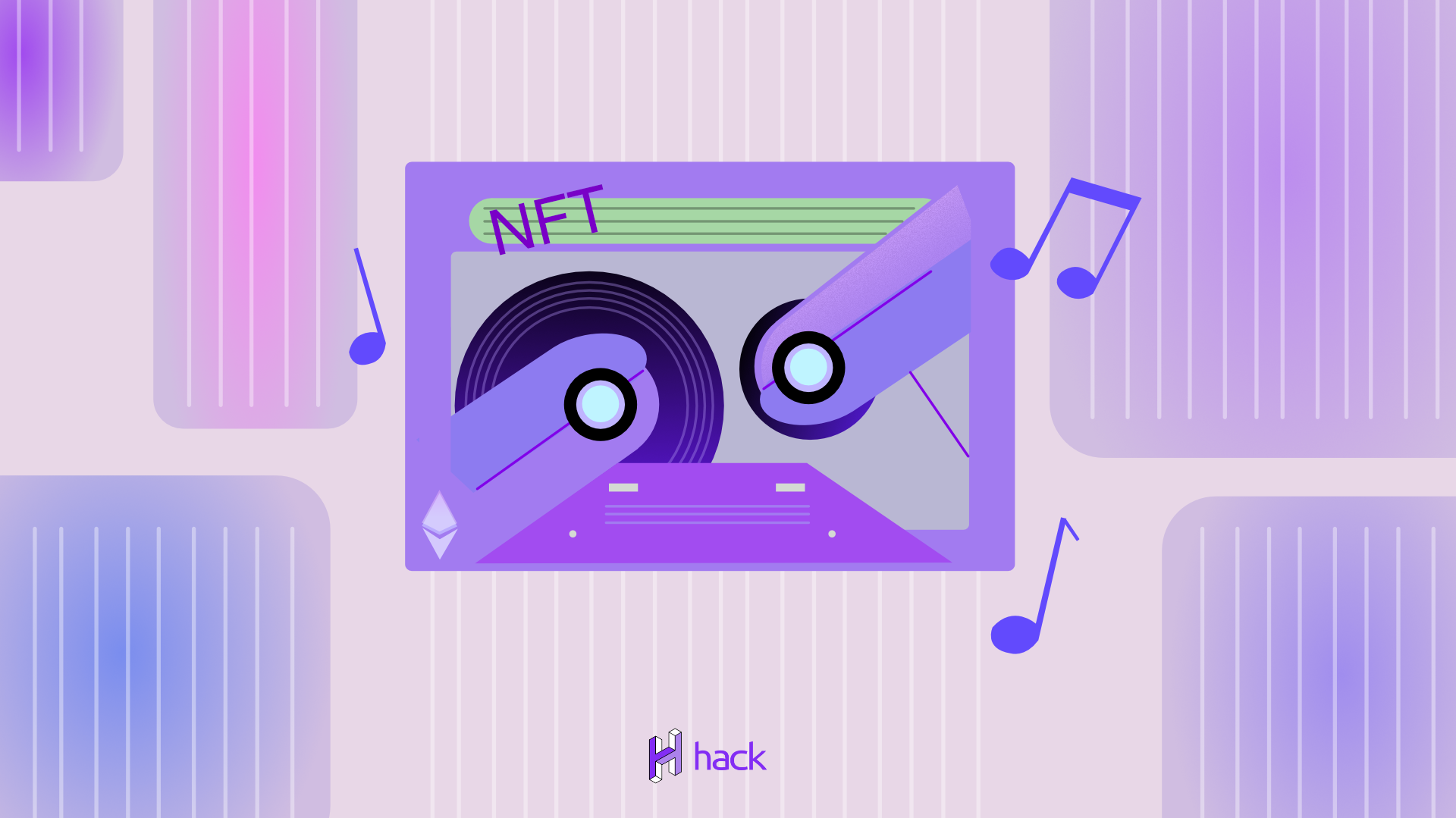2021 was arguably the year when non-fungible tokens (NFTs) exploded. Today, a little later, NFTs— the digital tokens stored on a blockchain that can record the ownership of items—have been developed for a wide swath of items, from digital art to game assets and real-world luxury goods and the numbers are head-turning: From a transaction volume of merely USD $40.69 million in 2018, NFT trading volume surged over $44.2 billion in 2021 and is continually reaching new heights. The NFT section is said to reach a market cap of $80 billion by 2025. In December 2021 alone, NFT transactions worth $4 billion were recorded and while NFTs in art, collectables and the metaverse and gaming have taken off, NFTs are said to transform the music industry as well.
There is a wide range of potential use cases for NFTs in the music industry. They can be used to grant access to discounted concert tickets, songs represented by an audio file or video, an album cover, a concert ticket, signed merchandise, special areas at concerts or meetups with the artist are some examples. It all depends on how the artist wishes to structure the NFTs they issue. All artists need are true fans who will support them.
How do music NFTs work?
Musicians find it especially difficult to sustain themselves in the industry and earn a living through their music. It is no secret that artists are not compensated fairly for their talent, efforts and work. These arrangements are usually fortified by the record deal and complex legal contracts that artists are made to sign at the time of onboarding by the record label.
According to reports, only the top 1% of musicians receive 90% of all streams, and only about the top 0.8% of the seemingly famous musicians earn an average of USD 50,000 per year from streaming. This is mostly due to the overall revenue being split between artists, record labels, agents, lawyers, distributors, and other “stakeholders” in the artists’ music. Moreover, with the record label holding full rights over the original recording of the song, the creator has no control over where and when it is played.
This puts serious restrictions on the creativity and freedom of the artists themselves.
Bob*, on the other hand, has decided to turn to a different model that allows him both financial and creative freedom- NFTs.
He started selling digital copies of his electronic pop songs as non-fungible tokens. He spent months cultivating relationships with NFT enthusiasts, built a community of devoted fans on Discord and then leveraged this popularity to raise tokens in campaigns to crowd-fund his upcoming album.
Bob also sells songs individually on the NFT music platform Catalog—which doesn’t require him to surrender the rights to his work.
Hundreds of musicians are following Bob’s steps into this world.
On Catalog, 140 artists have sold over 350 records for more than $1 million combined. In the digital collective Songcamp, dozens of musicians from across the world are forming teams to crank out music and multimedia pieces. Altogether, the goal of these NFT-based artists isn’t to top the charts, but to push technological boundaries and carve out a living outside of the record label system, which has dominated the music industry for decades.
So what are the NFT Music use cases:
Earning of royalties
Artists can earn a percentage of the sale price each time their NFT creation is sold on a marketplace. The payments for NFT royalties are permanent and managed automatically via smart contracts. On the majority of marketplaces, musicians can choose their royalty %. Royalties of between 5% and 10% are considered standard.
Cutting out middlemen
Traditionally, music distribution goes through agents, studios, record labels, record stores, and other third parties to reach their audience, and everyone gets a cut of the profit.
Selling music as NFTs involves only one other entity beyond seller and buyer: the NFT marketplace artists sell it on. Considering the lack of gatekeeping involved, the marketplace hardly acts as a middleman in the traditional sense. Artists just create music any way they choose, mint it, and upload it. All other barriers are removed. They are now able to combine their completely original artistic visions with a way to profit from them directly.
Building an active fanbase
Music NFTs allow an artist to build a fanbase by creating a space in which their fans can access unique NFTs related to the artist’s works. For example, events such as NFT airdrops enable artists to reach audiences they would not have had access to before.
Also, they can capitalize on unique fan experiences, such as having the opportunity for their fans to hang out with them virtually or in person. This has previously been accomplished by musicians such as Snoop Dogg, as well as Post Malone, who sold NFTs for people to play beer pong with him.
Providing opportunities to new artists
The low barriers to entry into the music NFT scene are a great opportunity for new musicians because no one holds them back from releasing new music or expects them to fit in a certain ‘box’ to score a record deal. With music NFTs, all a musician needs to do is to mint their music on their platform of choice and market their work to their fanbase.
Crowdfunding
Without major record labels funnelling money into musical business endeavours, artists may still need funding for various projects. NFTs provide a method for funding to be built from the ground up, rather than trickle down from the top.
If artists want to record a new album, for instance, they could promote their project via their social media channels and offer unique NFTs to those willing to throw down some funds for a project that doesn’t even exist yet. Musicians can offer NFTs for song demos, alternate artworks, unique merchandise, and anything else they can come up with. Fans could also be invited to invest in the financial future of an album or song in exchange for a cut of the royalties down the road.
Final Thoughts:
Only time will tell whether music NFTs are a mere byproduct of a bullish crypto market or a transformative force destined to transform the music industry. While optimists talk of a new “creator economy” and artistic autonomy, sceptics voice concerns about utility, and whether the current model of music NFTs will scale beyond a handful of artists who are heavily involved in the crypto community as many of the early buyers of music NFTs are crypto enthusiasts who are financially invested in seeing these spaces succeed.
However, music NFTs offer something, the traditional music industry cannot – value, among other things.
People find value in ownership of unique and original assets.
“Why buy the music you can already listen to?” The answer to that question is the same as buying JPEGs anyone can right-click and save.
But for some, the value could come from a closer relationship with the artist they like. For others, it could be financial exposure to an artist who they believe will thrive.
*Bob is a fictional character



